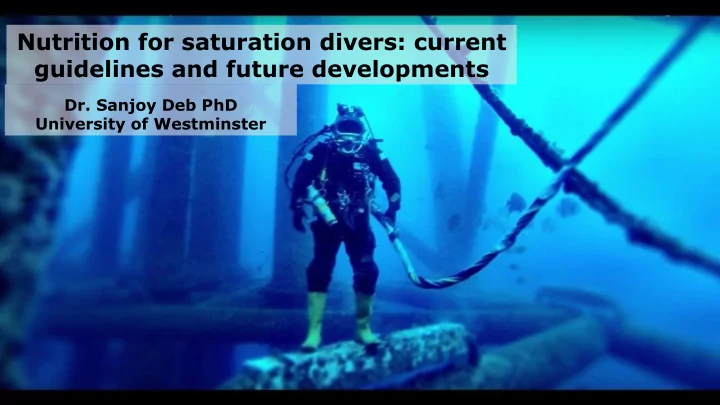

Nutrition for saturation divers: current guidelines and future developments Dr. Sanjoy Deb PhD University of Westminster
Background: why do we need nutritional guidelines? Challenges to the body Practical challenges • Loss in body mass (particularly muscle • Chamber limiting daily physical activity mass) • The environmental conditions (eg. • Disturbances to hydration status • Excess sodium loss Hyperoxia, helium and pressure) • Enhanced oxidative stress on key cells • Work shift patterns • Possible period of immunosuppression • Underwater excursions (increase chance of cold and flu) • Reduced red blood cell concentrations • No vitamin D availability due to lack of sunlight (UVB rays) Nutrition has the potential to support these physiological disturbance and therefore, support the health and performance of divers at work
Nutrition guidelines for saturation divers Energy balance Macronutrients Carbohydrates and fats Protein Micronutrients/ supplements Vitamin D Antioxidants (Vit C and E) Iron, Folate and Vit B12 Hydration (Daily and lockout) Nutrition for lockout
Overall Research aims 1. Develop a strong evidence base for effective nutritional guidelines for the health, performance and wellbeing of saturation divers while at work and home. 2. Translate research findings to saturation divers by developing a research informed guide to educate and encourage good practise amongst saturation divers
Ongoing research proje jects • To characterise the effect of saturation diving on vitamin D and calcium status; and subsequently identify the implications on bone health of divers. • Assess the energy demands of operational saturation diving.
Why is is it it im important to understand the energy demands? Supports: • Body weight maintenance • Immune function • Cognitive function • Delay/ reduce fatigue • Bone health Exercise Daily activity Calories BMR consumed
Saturation diving increases calories expenditure Significant increase in energy expenditure (average 430 kcal) was observed regardless of magnitude of hyperbaric pressure, therefore suggesting the hyperoxic and helium atmosphere are principle drivers.
Saturation Divers Are Susceptible To A Negative Energy Balance Consequence: • Body weight loss (Busch-Stockfish + Bohlen, 1994) • Increase likelihood of colds and flu (Brenner et al. 1999) • Impaired cognitive function and decision making • Early fatigue development during underwater excursions Environmental factors Calories consumed may also reduce Under water activity Daily activity BMR Due to: Reduced food palpability (e.g. only fresh vegetables maintain their taste) Potential appetite suppression post lockout
More research is is needed to id identify fy how many calo lories saturation div ivers need Supports: • Body weight maintenance • Immune function • Cognitive function • Delay/ reduce fatigue • Bone health Environmental factors Under water activity Calories BMR consumed
Vis isual l ou outlin line of of recent rese search testin ing protocol Blow down Bottom Time Decompression Saturation Measurement period Calorie expenditure assessment Time 21 0 5 14 (days) Tracer solution Urine samples collected Diet and activity log Spit sample D-1 D14 End D2 D5 Decompression 4 OMNIgene ORAL End D-1 D2 D5 D14 4 Blood sample D-1 End Figure showing the timeline of research, which includes a 10-day calorie expenditure assessment, 2 types of spit sample and blood collection. ‘D’ under symbol represent the day after blow down that the respective samples is taken. D -1 represent pre-saturation medicals. End represents post -saturation medical.
Future research projects 1. Identify the optimal dose of vitamin D and calcium supplementation to support bone health and immune system in saturation 2. Investigate the role of anti-oxidant supplements in minimising the oxidative stress that may occur during saturation diving. 3. Identifying methods to monitor and advice on appropriate hydration strategies for saturation divers. 4. Design, implement and evaluate the effectiveness of a nutritional education platform designed for saturation divers and support personnel.
Overall Research aims 1. Develop a strong evidence base for effective nutritional guidelines for the health, performance and wellbeing of saturation divers while at work and home. 2. Translate research findings to saturation divers by developing a research informed guide to educate and encourage good practise amongst saturation divers
Thank you
Recommend
More recommend